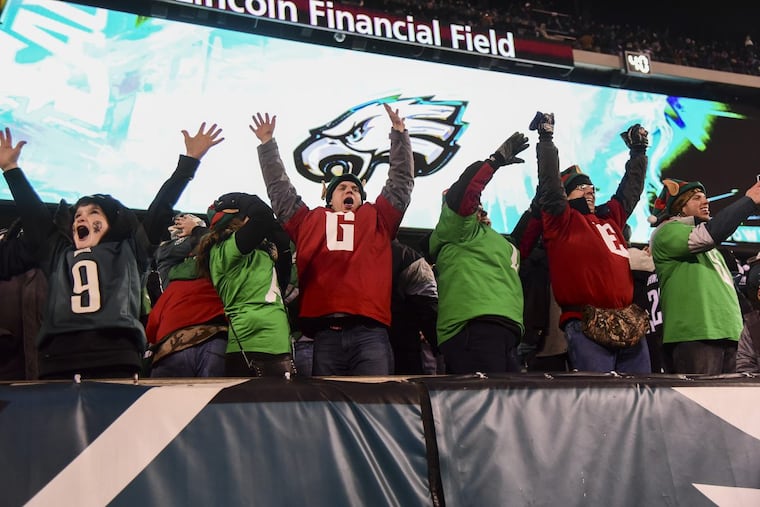The myth of the Eagles' home-field advantage | Mike Sielski
The Eagles will have home-field advantage in the playoffs, and it's common to think that playing at Lincoln Financial Field will give them a big edge. The evidence says otherwise.

The Eagles are in a tough spot in these playoffs. You'd have to be a pie-in-the-sky dreamer or have an agenda to argue otherwise.
It's not just that Carson Wentz is injured and unavailable and that any team that had lost the prospective NFL most valuable player would be expected to regress a bit. It's that Nick Foles was so unsteady over the team's final two regular-season games, and that his unsteadiness was apparent to everyone. It was so apparent that coach Doug Pederson, after reaffirming during a news conference Tuesday that Foles would start in the Eagles' divisional-round game next week, sent text messages to individual media members re-reaffirming that Foles would start. You know, just in case any Eagles fans (or men within the locker room) were questioning the coach's confidence in and commitment to his quarterback. The Dougie doth protest too much, methinks.
It's not just that the rest of the NFC is formidable: Of its six postseason qualifiers, five won at least 11 games, and the one that didn't – the Falcons – represented the conference in last year's Super Bowl. It's that the Eagles played just three playoff teams all season, going 2-1 in those three road games, with Wentz starting each one. So, no one can say with certainty how the Eagles will fare against this heightened measure of competition, especially without Wentz.
And that's when the dreamers throw down their trump card, or what they think is their trump card: home-field advantage. The Eagles have it throughout the NFC tournament, and the dreamers presume it will be the great leveler. It will present conditions, from the frothing fan base in the Lincoln Financial Field stands to the winter weather, that can bring any and all Eagles opponents to their knees. The Saints, the Falcons, the Panthers: Any team the Eagles might face in the divisional round will be either a warm-weather or dome-home team and, as such, will be less equipped to thrive in the unforgiving surroundings. This is Philadelphia, after all. This is the toughest city in America, with the best fans in America, and if anything can help the Eagles overcome Wentz's absence and the quality of their opponents, it's the presence and passion of the people who will fill the Linc.
This is the gospel of Philadelphia football. And relatively speaking, it's a myth.
The notion that the Linc, like Veterans Stadium before it, is a particularly challenging and nasty place for a team other than the Eagles to perform is a sacrosanct tenet of our civic religion. It's self-serving, and it plays to the insecurity and inferiority complex that have long characterized the Philadelphia area's collective sports psyche, but it's the canon of the culture nonetheless. The problem is, the evidence – expressed both in data and in anecdotal experience – really doesn't support it.
In August, just before the start of this NFL season, ESPN's Bill Barnwell made a detailed attempt to quantify which teams actually enjoy significant advantages in their home stadia. Beginning with the 1990 season, Barnwell calculated each team's average point differential for regular-season home and road games. He then added those two figures and divided by two to get each team's "observed point differential" – that is, the average advantage, in points per game, that a team derived from playing at home.
Why did Barnwell use point differential and not win-loss records? "Point differential," he wrote, "does a better job of predicting future win-loss record than winning percentage itself."
What Barnwell found should be sobering to Eagles fans and followers. Over the most recent 10-year period, 2007 through 2016, the Eagles' observed point differential at home was 2.0 – the 21st-best mark among the league's 32 teams. And over the entire 30 years that Barnwell examined, the Eagles' average advantage at Lincoln Financial Field was worth just 1.7 points. Just two teams/homes were worse: the Dallas Cowboys/AT&T Stadium (1.3) and the Redskins/FedEx Field (1.2). Oh, and if you're thinking that the 700 Level and that infamous artificial turf gave the Eagles a huge edge, think again: Their observed point differential at Veterans Stadium was just 1.9.
To be fair, the Eagles are 7-1 at the Linc this season, and their defense has been particularly stout there, giving up fewer than 14 points a game. And, to his credit, Barnwell acknowledged "there's a lot we don't know" about the factors that affect home-field advantage. He also did not include postseason games in his analysis – in all likelihood because the sample sizes vary too much from team to team.
But it's interesting to note that the team that has had the NFL's largest observed point differential since 2007, the Seattle Seahawks (5.1 at CenturyLink Field), has also won its last 10 home playoff games. The Eagles, meanwhile, have lost their last two home playoff games, including their most recent one, to Drew Brees and the Saints in January 2014.
That's the data. Now, for the anecdotal aspect. Anyone who has attended a professional sporting event in Philadelphia knows that Lincoln Financial Field, Citizens Bank Park, or the Wells Fargo Center can be as unaccommodating a venue for the home team as it is for the visitors. If, early in this divisional-round game, Foles plays poorly or the Eagles fall behind, the crowd at the Linc will grow loud in its impatience and nervousness, because Philadelphia fans' instinctive reaction to adversity isn't optimism. It's dread.
So, Foles and the Eagles would do well to get off to a good start at home, no matter whom they end up playing in the divisional round or beyond, and that's not any kind of advantage.
That's just the truth.